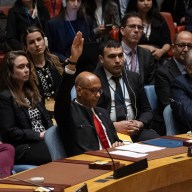 Cooper Union students protest the implementation of tuition, as seen in “Ivory Tower.”
Cooper Union students protest the implementation of tuition, as seen in “Ivory Tower.”
Credit: Samuel Goldwyn Films
‘Ivory Tower’
Director: Andrew Rossi
Genre: Documentary
Rating: PG-13
3 (out of 5) Globes
Activist documentaries love to offer rigid, shocking statements on subjects we hold dear: Meat is bad for you, we’re doomed to this or that environmental catastrophe, a terrorist strike was an inside job. Some are more convincing and rigorous than others; some of these others are outright lies. At times it seems like “Ivory Tower” is out to sell a line, namely that college is a vestigial fixture of modern life — a pointless extravagance that drives students into sometimes insurmountable debt while their dreams burn in front of their eyes.
Truth is, while “Ivory Tower” plays with this as an idea, it’s not one it’s really floating. It’s not floating any hard-line idea. This isn’t a thesis film, but one that explores an issue from as many angles as it can in the traditional documentary length of around 90 minutes. It is, as they say, just asking questions, except that the questions are the ones that should be asked, even if what the film reveals is one giant mess that has been very badly controlled.
The film’s entryway is the price of college, both in the rise of tuitions (1,120 percent since 1980, far more than even health care or food) and in student debt, which semi-recently crossed the one trillion dollar mark. This was created, director Andrew Rossi argues, by a perfect storm that found states pulling money from education — some politicians seeing college as being about mere intellectual curiosity — and the reckless spending of certain universities. Even the Cooper Union, the longtime free NYC university, has had to go implement a tuition after being put in the hole by a new, ridiculously extravagant building and the economic apocalypse of 2008. (The one charge he doesn’t make is the old line that college merely brainwashes students, which omission is for the best.)
 Stanford University is one of many institutions that get analyzed in “Ivory Tower.”
Stanford University is one of many institutions that get analyzed in “Ivory Tower.”
Credit: Samuel Goldwyn Films
But finding alternatives is just as much of a headache. Online schooling is fraught with problems, including students who lag behind without a hands-on approach. Though it finds some hope in an “UnCollege” movement in San Francisco, such methods have not yet been proven to be equivalent to higher education at its best. And much as people tout the Internet as a great way to school one’s self, that puts too much emphasis on the veracity of what one finds on one’s own. (Perhaps not everyone’s as foolhardy at self-teaching as Jenny McCarthy, but still.)
Rossi previously made “Page One: Inside the New York Times,” which took a more sympathetic — though very critical — look at another institution on the verge of crumbling, and helped inflate the popularity of David Carr and Brian Stelter. Here he ditches the fly-on-the-wall approach and token “stars” for an argumentative, essayistic style, jumping from issue to issue and institution to institution, though remaining ultimately detached and clinical. But if it doesn’t take a side, it’s clear that it’s saying colleges are not only in trouble themselves, but have created a broader set of problems that may be impossible to solve.
Follow Matt Prigge on Twitter @mattprigge
















